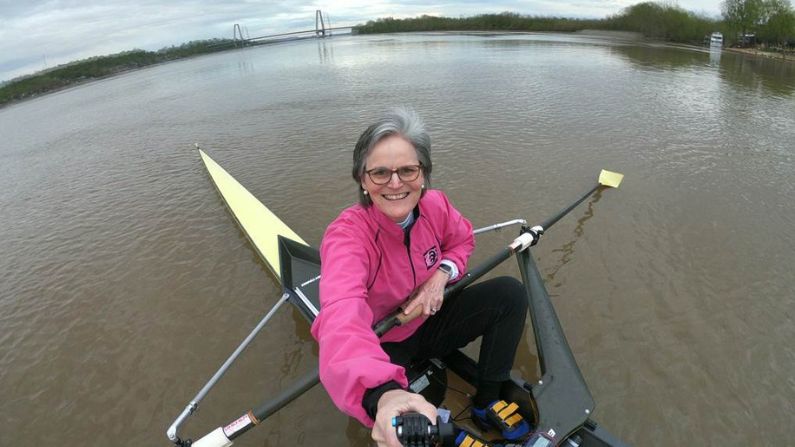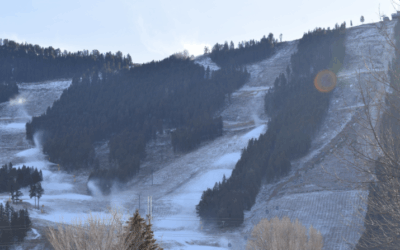Female empowerment nonprofit Womentum will welcome Tori Murden McClure to Jackson on Oct. 4 to give a talk on exploration at The Center Theater. McClure was the first woman and first American to row across the Atlantic Ocean and ski to the South Pole. She’s now the president at Spalding University, a Catholic university in Kentucky.
Before the event, McClure joined KHOL on Zoom to discuss what inspires her outdoor and academic curiosities. This conversation has been edited for clarity and brevity.
Hanna Merzbach/KHOL: You were the first woman and the first American to row solo across the Atlantic Ocean. I have to ask, what does it feel like to be out in the middle of the Atlantic alone?
TORI MURDEN MCCLURE: Well, as we’re doing this interview, there is a hurricane bearing down on Florida. And it took me two tries to row alone across the Atlantic Ocean. The first solo attempt, I got hit by a hurricane named Danielle and then the remnants of a hurricane named Earl. And so I’m not a big fan of hurricanes. And I’ve reached an age where the damage from the hurricane has really started to catch up with me. So, there are times out there where you just feel completely at one with the universe and you’re seeing extraordinary things like whales and dolphins in their own habitats playing and singing and there’re these wonderful symphonies that happen in the middle of the ocean and feel really privileged to to see the world in a way that very few people get to see it. There are other days when you’re just living in abject fear.
KHOL: I know you didn’t stop there. You were the first woman to ski to the South Pole. Where did this drive come from to go across the ocean and ski to the South Pole?
MCCLURE: I grew up with a brother. His name is Lamar, and he has intellectual disabilities. And I couldn’t always protect him from the world. And I was always trying to become bigger and smarter and stronger and faster so that I could stop injustices that were happening right in front of me. It started with my brother and grew into other groups of people. And every once in a while, I get so angry with civilization that I just have to leave. And the first time I really, truly left civilization, I skied to the South Pole. And I was in divinity school at the time at Harvard and was working with homeless people in South Boston and in the outskirts of Cambridge, near MIT. And that sense of being in one of the most privileged environments on the planet, Harvard University, and seeing homeless people in the shadows of that institution was just heartbreaking for me. And I left to ski to the South Pole thinking, ‘Okay, I’m just going to go and recover and make some sense of it and come back and get back to the pick-and-shovel work of trying to make a difference in this world.’ I don’t know if it’s my own form of mental illness, but I have this intellectual passion that occasionally takes a physical form, and I just have to leave civilization and go off and try to make sense of it.
KHOL: Is there anything you’ve done more recently that fills that category?
MCCLURE: What I do these days is I go camping or backpacking with students. I was always aware of my educational privileges. I wasn’t so much aware of my experiential privileges until I went camping with students from Spalding University. Most of our students are from Kentucky or very close to Kentucky. A high percentage of our students are Pell eligible, so many economically challenged students. And I was accustomed to camping with astronauts and folks who’d climbed Everest. To go camping with students, I say, ‘Okay, just bring whatever you have. We’re going to meet at my house, and I’m just going to split up gear.’ And literally, students arrived with plastic bags to use as rain gear and a sack full of Subway sandwiches as their plan for food for the weekend. And it just was like, ‘Okay, wow.’ I’ve inherited enough gear over the years, I can outfit a platoon. So I’m dressing students, and we go out in the woods and they’re like, ‘Oh, my goodness, the president is sleeping outside on the ground.’
KHOL: You’re now the president at Spalding University, a Catholic university in Kentucky. What was it like to transition to this full-time career in academia?
MCCLURE: It’s a great way to spend one’s time, particularly if you care about social justice or justice or fairness in humanity, because whatever whatever makes you angry, whatever upsets you, whether it’s environmental protection or poverty or ignorance or racism or despair, all of those things are improved by improving the education of our young people. And so I look at it as attempting to corrupt the youth of the nation in a good way.
KHOL: You’re coming to the Center Theater in Jackson next week to give a talk about firsts, exploration and choosing your journey. Could you give me a sneak peek on what your talk will entail?
MCCLURE: I’m going to be interviewed by a very good friend, Annie Morita, who’s done her own kinds of adventures and lives in Jackson. And I’m hoping we end up taking questions from the audience. Annie’s written a bunch of super esoteric questions, and while I’d be thrilled to answer those super esoteric questions, I’d be equally thrilled to take questions from the audience and see where the audience wants to go. But, you know, I don’t see myself as that unusual. Yeah, I’ve gone a little astray from the norm in rowing across the ocean and skiing to the South Pole. But we all have a need to make the differences that we can in the world. We all have a need to lean into making things better. And I hope my message has to do with compassion and education and things like that.
KHOL: Jackson is home to many young adventurers. What would your message be for them?
MCCLURE: Go out and chase your dreams. There was this moment at the height of the hurricane and the boat’s pitch poling, doing all sorts of things, and I really thought I was not going to make it. And I went out on deck intending to set off my distress beacon, and I couldn’t do it because I just couldn’t ask another human being to come out into that storm to get me. So I was in the cabin with the camera kind of saying goodbye, and I thought about all the young people who might be following my journey. And I said, ‘You’ve got to chase your dreams. You gotta do it.’ They don’t always work out, but you gotta chase your dreams. And so many times we see the barriers, whether it’s you can’t afford it or you don’t get the time off work or whatever, just just chase that dream and knock on the doors and see if they’ll open for you. Because, you know, more often than not, they will.
In-person and livestream tickets are still available here for McClure’s talk on Oct. 4 at 7 p.m. The in-person event is $38 for adults and $28 for students, while livestream access is $10.
Listen above for KHOL’s full conversation with Tori Murden McClure.






